An English playwright, poet, and often regarded as one of the best writers to have ever written in English, William Shakespeare is the most recognized writer in the world.
His plays are translated into over 50 languages and performed for audiences of all ages all around the globe.
Shakespeare, sometimes known popularly as “The Bard” or “The Bard of Avon,” was an actor and the originator of the Globe Theatre.
In contemporary times, Shakespeare seems to have something to say to us all the time.
Shakespeare’s greatest remarkable achievement, perhaps, is this genuine response elicited in individuals centuries after he created his art.
Four hundred years later, his singular contribution to our society, language, and imagination has been to universalize the experience of living and writing in late 16th-century England.
He has come to be generally recognized and revered as the greatest playwright on the planet, with numerous recognizable works like Romeo and Juliet, A Midsummer Night’s Dream, Hamlet, Antony and Cleopatra, and of course- Macbeth.
What is Macbeth’s major moral?
Content
The main moral of the play is unadulterated ambition. The play’s core theme, the carnage inflicted when ambition is uncontrolled by moral restrictions, is most powerfully expressed in the play’s two main characters- Macbeth and Lady Macbeth.
Is Macbeth based on a true story?
Yes! Macbeth, like many of Shakespeare’s plays, has historical roots. It is based on the story of King Duncan who ruled Scotland in the 11th century until he was assassinated in combat by Thane Macbeth.
What quote from Macbeth is the most famous?
Macbeth has many iconic quotes that have cemented themselves into the contemporary mindset. Among the many, some famous quotes from Macbeth include- “Double, double toil and trouble; Fire burn, and cauldron bubble,” said by the three witches. “Look like the innocent flower, But be the serpent under it,” said by Lady Macbeth. And finally, “Fair is foul, and foul is fair,” said Macbeth himself.
The History of the Play
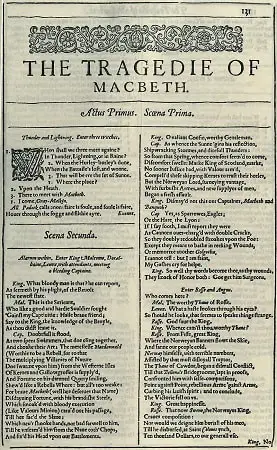
William Shakespeare’s Tragedy of Macbeth, famously known as Macbeth, is a play based on a tragedy presented in 1606 for the first time.
It depicts the harmful effects, both psychological and physical, that came due to the political ambition of individuals wanting power.
Macbeth especially depicts the affiliation of the reign of King James I who was also the main sponsor of William’s playing troupe.
Though Macbeth cannot be precisely dated, it is typically considered to be contemporaneous with the other canonical tragedies (Hamlet, Othello, and King Lear).
While some academics believe Shakespeare wrote the play as early as 1599, most assume it was written no earlier than 1603 since the piece is usually seen to honor King James’ ancestors and the Stuart succession to the throne in 1603.
The occurrences in the play differ significantly from the history of the real Macbeth. The circumstances of these tragedies are mainly associated with Henry Garnet’s execution for his role in the 1605 Gunpowder Plot, given internal allusions to the 1605 plot and its subsequent trials.
Around reality, nevertheless, there are numerous allusions and plausible pieces of evidence pointing to the Plot, and as a result, many critics conclude that Macbeth was written in 1606.
Moreover, some people backstage this play considered it to be cursed, and referred to it as the famous “The Scottish Play.”
King Macbeth — The Historical Figure
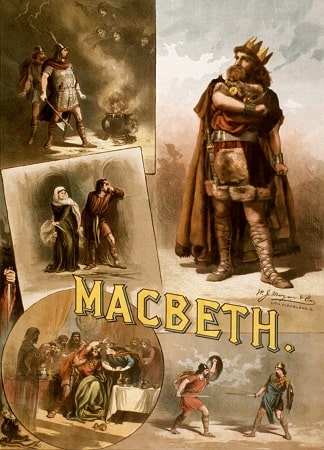
Macbeth was a Scots monarch whose reign was defined by effective management and the advancement of Christianity.
But he is better remembered as the murderer and usurper in William Shakespeare’s tragedy.
Shakespeare’s Macbeth, however, exhibits little similarity to the real-life Scottish ruler of the 11th century.
Mac Bethad mac Findláich, also known as Macbeth in English, was born around 1005. His father was Finlay, Mormaer of Moray, and his mother was maybe Donada, Malcolm II’s second daughter.
A ‘mormaer’ was literally a senior steward of one of Scotland’s ancient Celtic provinces, but the word is frequently translated as ‘comes,’ which means earl in Latin records.
He assassinated the governing King, Duncan I, in combat near Elgin, Morayshire, in August 1040. Macbeth then ascended to the throne.
His marriage to Kenneth III’s granddaughter Gruoch also bolstered his throne claim. Then, at Dunkeld in 1045, Macbeth conquered and killed Duncan I’s father, Crinan.
Macbeth appears to have reigned equitably for 14 years, enforcing law and order and supporting Christianity. He also went to Rome for a papal jubilee in 1050.
Likewise, he was also a bold leader who led victorious incursions into Northumbria, England.
Siward, Earl of Northumbria, who’d been attempting to restore Duncan’s son Malcolm Canmore, his nephew, to the throne, opposed Macbeth in 1054.
Consequently, Malcolm Canmore assassinated Macbeth in the Battle of Lumphanan in Aberdeenshire in August 1057.
Macbeth Synopsis – Summary of the Play
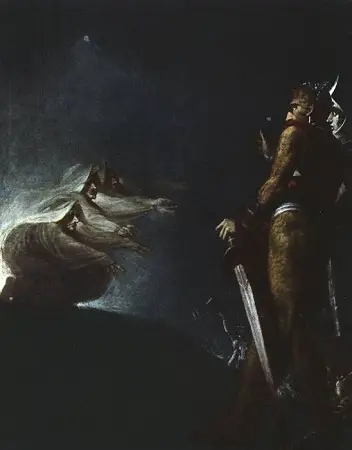
In general, we can summarize the play as such- three witches predict that the Scottish general Macbeth will become King of Scotland.
Then, Macbeth, urged on by his wife, murders the King and becomes the new King. He then murders additional people out of paranoia.
Civil war erupts in an attempt to depose Macbeth, resulting in even more deaths.
This meek summarization, however, is only the surface-level what’s-what of the play.
The entire play is divided into several acts and contains nuanced characters that battle emotional turmoil and commit deeds out of jealousy and spite. Given below are more details about the play.
Act One
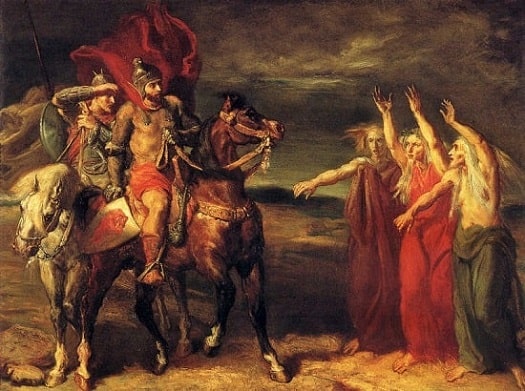
Two of King Duncan’s generals, Macbeth and Banquo, uncover three odd women on a desolate Scottish moorland (witches).
The witches predict that Macbeth will be exalted twice: once to Thane of Cawdor (an aristocratic title awarded by grateful rulers) and another to King of Scotland.
Banquo’s progeny will be kings, but he will not inherit a kingdom. The generals are eager to learn more, but the “strange sisters” vanish.
Soon after, King Duncan appoints Macbeth Thane of Cawdor as a prize for his previous victories.
The promotion seemed to back up the prophecy. The King then suggests paying a brief visit to Macbeth’s castle in Inverness that night.
Meanwhile, Lady Macbeth learns about the prophecy and her husband’s new status from her husband. She promises to assist him in becoming King by whatever means necessary.
Act Two
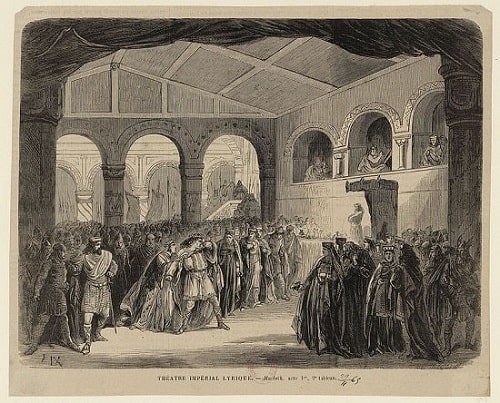
Macbeth arrives in his castle, followed by King Duncan nearly immediately. It is then that the Macbeths conspire to assassinate Duncan when everyone is sleeping.
Lady Macbeth delivers the guards intoxicated wine at the prescribed moment, allowing Macbeth to enter and assassinate the King. He instantly regrets it, but his wife reassures him.
Then, just as Macduff, a nobleman, comes, she leaves the bloodied daggers by the dead King.
When Macduff finds the scene of the murder, Macbeth executes the inebriated guards in a fit of wrath and vengeance.
Duncan’s sons, Malcolm and Donalbain, leave, scared for their life, but they are nonetheless implicated in the crime.
Act Three
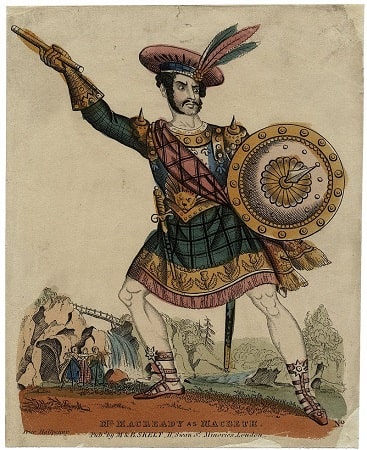
Macbeth ascends to the throne of Scotland, but he is haunted by thoughts of uncertainty.
He recalls the prophecy that Banquo’s progeny will inherit the throne and prepares for the assassination of Banquo and his son Fleance.
Banquo is then assassinated in the dark, but his son evades the killers. That night, at his royal supper, Macbeth glimpses the ghost of Banquo and scares the courtiers with his erratic response.
Lady Macbeth refutes the court and attempts in vain to soothe her husband.
Act Four
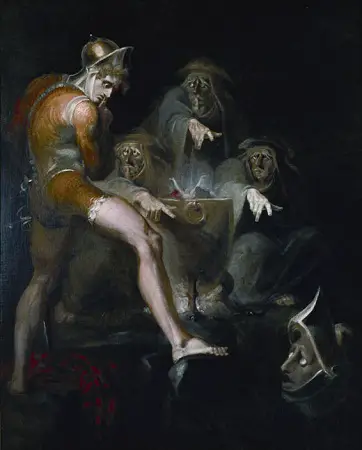
Macbeth searches for the witches, who assure him that he will be protected until a nearby wood, Birnam Wood, levies into battle against him.
They also assure him that he also has no need to be afraid of anyone “born of a woman” (natural birth).
Furthermore, they also predict that Banquo’s son will still be the heir to the Scottish throne.
Macbeth then begins a reign of terror, murdering many people, including Macduff’s family.
Then, Macduff goes to the English King’s court to look for Malcolm (one of Duncan’s sons who had fled).
Malcolm is youthful and insecure, but Macduff, who is bereaved, persuades him to command an army against Macbeth.
Act Five
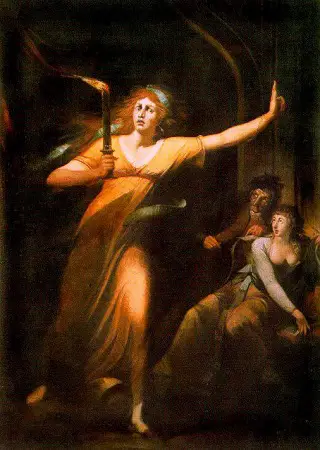
Macbeth is safe in his secluded fortress at Dunsinane until he learns that Birnam Wood is approaching him.
Malcolm’s army is using forest branches as concealment for their assault on Macbeth’s fortress.
Meanwhile, an overwrought and guilt-ridden Lady Macbeth wanders in her sleep and confides in her doctor.
She then takes her own life. Macbeth learns of Lady Macbeth’s demise and grieves as the final battle begins.
Macduff confronts Macbeth in the midst of a hopeless battle. Macbeth realizes he is doomed when he discovers Macduff is the kid of cesarean birth and yields to his opponent.
Macduff succeeds and takes the traitor Macbeth’s head to Malcolm. Malcolm proclaims peace and travels to Scone to be proclaimed King.
Themes and Motifs of Macbeth
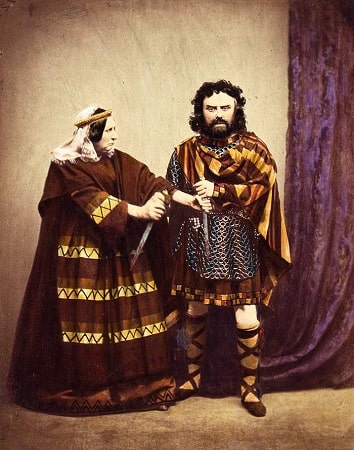
In several ways, Macbeth is an outlier among Shakespeare’s tragedies. It is short: almost a thousand lines shorter than Othello and King Lear, and only slightly longer than Hamlet.
Many reviewers have speculated that the received version is based on a substantially edited source, possibly a prompt book for specific performance.
This would be consistent with other Shakespeare plays that exist in both Quarto and Folio editions, with the Quarto editions often being lengthier than the Folio editions.
Macbeth was initially published in the First Folio, but there is no Quarto edition. However, if there was one, it would most likely be lengthier than the Folio version.
Nevertheless, Macbeth, as a tragedy, dramatizes the psychological ramifications of unfettered ambition.
The fundamental themes of the play—loyalty, guilt, innocence, and fate—all revolve around the central subject of ambition and its consequences.
Shakespeare, too, employs imagery and symbolism to convey the themes of innocence and guilt.
When elaborating on the play’s motif, Macbeth’s fatal fault is his ambition. It is eventually responsible for Macbeth’s downfall since it is morally bankrupt.
Two things fuel his ambition: the prophecy of the Three Witches, who declare that he will not only be the Thane of Cawdor, but also King, and his wife’s disposition, which mocks his assertiveness and virility and actively stage-directs her husband’s activities.
Macbeth’s ambition, on the other hand, quickly spirals out of control. He believes that his power is under threat and that the only way to keep it is to murder his suspected opponents.
Ultimately, ambition leads to the downfall of both Macbeth and Lady Macbeth. Lady Macbeth acquiesces to insanity and commits suicide.
After being vanquished in battle, Macbeth himself is also decapitated by Macduff.
Likewise, the play also raises the issues of fate and free will. The witches predict that he will become Thane of Cawdor, and he is anointed with that title without having to do anything.
The witches foretell Macbeth’s fate, but Duncan’s murder is the result of his own free will, and the other assassinations are the result of his own plotting after Duncan’s assassination.
This also elucidates other visions the witches conjure for Macbeth: he interprets them as proof of his invincibility and acts accordingly, yet they foreshadow his demise.
Conclusion
Investing any amount of time in Shakespeare’s works quickly reveals why the Elizabethan playwright is so monumentally renowned and global.
From his fanciful use of history, myth, and folklore as the facade to his stories to his aptitude to tap into a conscious predicament with violent illustrations and lovely romances, Shakespeare’s plays are simply ageless.
His wordsmithing and classic passages allude to his longevity as well. All of these things, and more, have contributed to his legacy being timeless.
After all, we ourselves may not all be Romeo and Juliet’s lovelorn youth. We may not all be like Hamlet, the distraught and spiteful Danish prince.
But while reading Shakespeare, we can tap into the fundamental human yearnings for love and justice and identify the stories in all of our lives that simply take different shapes.
